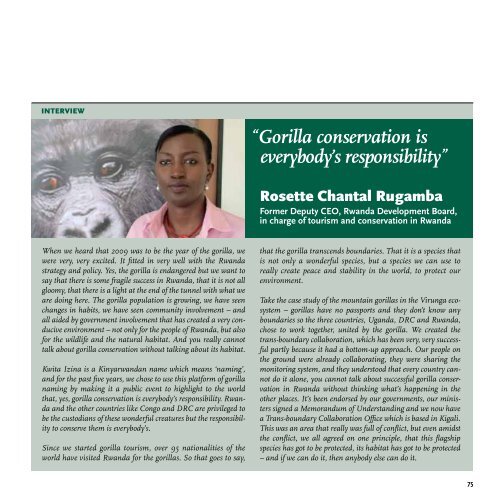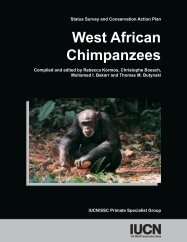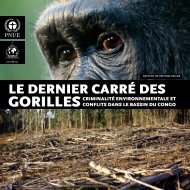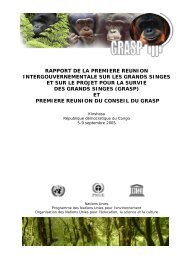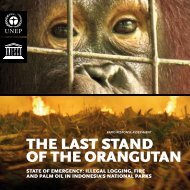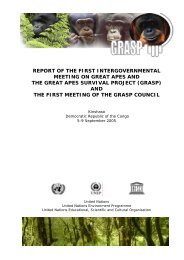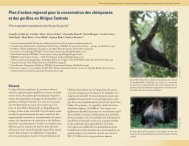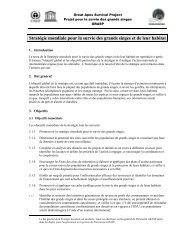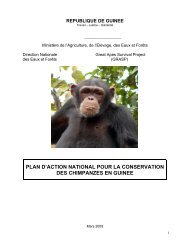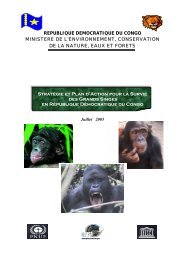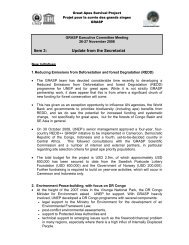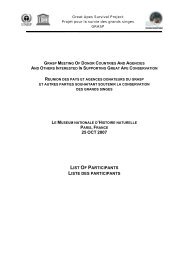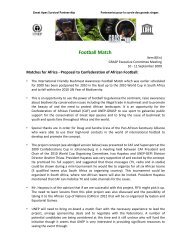THE LAST STAND OF THE - GRASP
THE LAST STAND OF THE - GRASP
THE LAST STAND OF THE - GRASP
Create successful ePaper yourself
Turn your PDF publications into a flip-book with our unique Google optimized e-Paper software.
INTERVIEW<br />
“Gorilla conservation is<br />
everybody’s responsibility”<br />
Rosette Chantal Rugamba<br />
Former Deputy CEO, Rwanda Development Board,<br />
in charge of tourism and conservation in Rwanda<br />
When we heard that 2009 was to be the year of the gorilla, we<br />
were very, very excited. It fitted in very well with the Rwanda<br />
strategy and policy. Yes, the gorilla is endangered but we want to<br />
say that there is some fragile success in Rwanda, that it is not all<br />
gloomy, that there is a light at the end of the tunnel with what we<br />
are doing here. The gorilla population is growing, we have seen<br />
changes in habits, we have seen community involvement – and<br />
all aided by government involvement that has created a very conducive<br />
environment – not only for the people of Rwanda, but also<br />
for the wildlife and the natural habitat. And you really cannot<br />
talk about gorilla conservation without talking about its habitat.<br />
Kwita Izina is a Kinyarwandan name which means ‘naming’,<br />
and for the past five years, we chose to use this platform of gorilla<br />
naming by making it a public event to highlight to the world<br />
that, yes, gorilla conservation is everybody’s responsibility. Rwanda<br />
and the other countries like Congo and DRC are privileged to<br />
be the custodians of these wonderful creatures but the responsibility<br />
to conserve them is everybody’s.<br />
Since we started gorilla tourism, over 95 nationalities of the<br />
world have visited Rwanda for the gorillas. So that goes to say,<br />
that the gorilla transcends boundaries. That it is a species that<br />
is not only a wonderful species, but a species we can use to<br />
really create peace and stability in the world, to protect our<br />
environment.<br />
Take the case study of the mountain gorillas in the Virunga ecosystem<br />
– gorillas have no passports and they don’t know any<br />
boundaries so the three countries, Uganda, DRC and Rwanda,<br />
chose to work together, united by the gorilla. We created the<br />
trans-boundary collaboration, which has been very, very successful<br />
partly because it had a bottom-up approach. Our people on<br />
the ground were already collaborating, they were sharing the<br />
monitoring system, and they understood that every country cannot<br />
do it alone, you cannot talk about successful gorilla conservation<br />
in Rwanda without thinking what’s happening in the<br />
other places. It’s been endorsed by our governments, our ministers<br />
signed a Memorandum of Understanding and we now have<br />
a Trans-boundary Collaboration Office which is based in Kigali.<br />
This was an area that really was full of conflict, but even amidst<br />
the conflict, we all agreed on one principle, that this flagship<br />
species has got to be protected, its habitat has got to be protected<br />
– and if we can do it, then anybody else can do it.<br />
75


